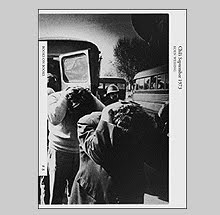Abeceda Dusevniho Prazdna by Zdenek Tmej
"Unmarried Czech workers will be used as a group in the most remote parts of the Reich and will thereby be prevented from starting families in the territory of the protectorate." This was the decree under which, in the autumn of 1942, Zdenek Tmej was ordered to the town of
Alphabet of Spiritual Emptiness is one of the books that I was able to discover firsthand during the Christie's photobook auction and within the short time I was able to spend with it, like Bill Brandt's London at Night
In essence the life depicted in Tmej's photographs is one narrowed down to the basics of passing time. Men are seen sleeping (in makeshift wooden bunk or row beds with straw bedding), eating (soured unpeeled potatoes or boiled cabbage), playing cards, and visiting the brothel next door (for the use of non-Germans only). From what I can remember there is not a photograph of the actual work that they were being forced to perform. Its presence is felt with the exhaustion and wear that is shown in both expression and shoe leather.
Their surroundings unlike in most photographs of labor or concentration camps reveals itself to be a space of former elegance -- used and disrupted by new improvisations to accommodate living for a large group of men. High arched windows (on which if one looks closely they will see a painted characters of Disney's seven dwarves), ornately framed mirrors, decorative ceiling moldings and bentwood chairs all give clues to this appropriation.
As I mentioned before, the tone here is one of passing time but it is not the usual show of overwhelming depression and abuse that one might expect from such a subject. The men, although forced to be there and exposed to constant physical exertion, seem to be dealing with the consequences and at times, expressing cheer in front of Tmej's camera -- especially while visiting the brothel and dancing and joking with the prostitutes. The prostitutes are the 'other' type of prisoner, and like the men in the camp next door, they express knowing smiles and bouts of laughter that momentarily removed them from their plight. Tmej's description is one of purgatory -- people stuck without the ability to move forward or backwards in a world, as the title suggests, of spiritual emptiness.
This book is obviously extremely rare now but I do want to direct your attention to a small book published by FotoTorst on Zdenek Tmej which is dedicated to this material discussed above. Called Zdenek Tmej: Totaleinsatz this is one in a small series of books of Czech photographers that some of you may be familiar with due to the inclusion of a FotoTorst on Josef Koudelka.
This book includes 87 of Tmej's photographs where as the Alphabet of Spiritual Emptiness contains only 45. Oddly, in comparison neither book reproduces many of the same photographs. This FotoTorst publication offers many unseen images from the series and variants -- some of which are flopped versions of pictures that appear in Spiritual Emptiness. This also features a few photographs of the men actually at labor repairing railroad beds and unloading mail cars.
The series offers good printing and a fine variety of relatively little discussed photographers. In the case of Tmej, where else can you own some of the material from this great body of work?
Note: I purchased my copy in












